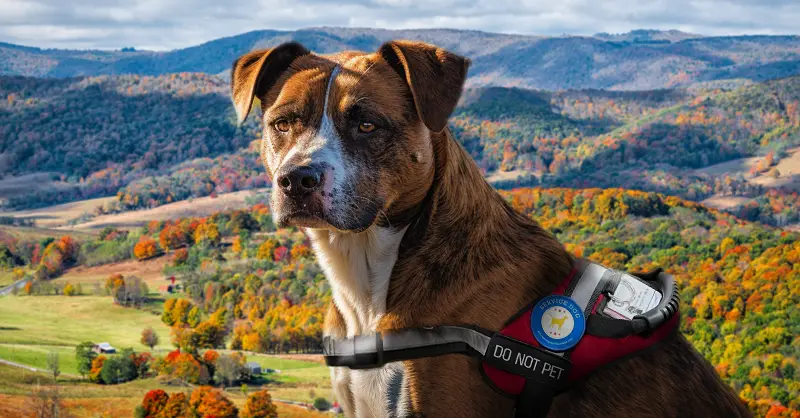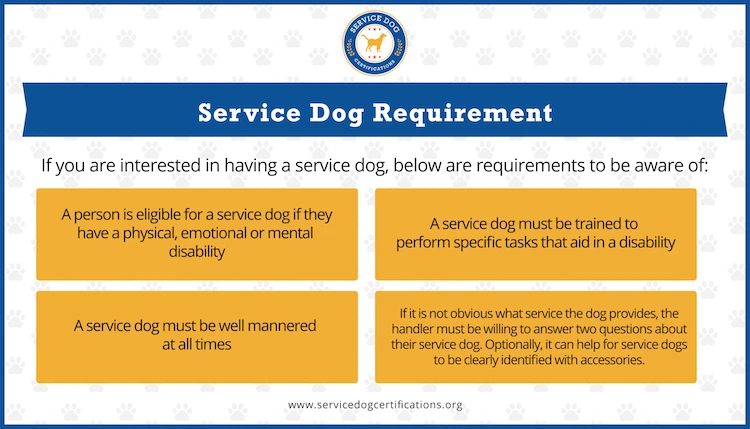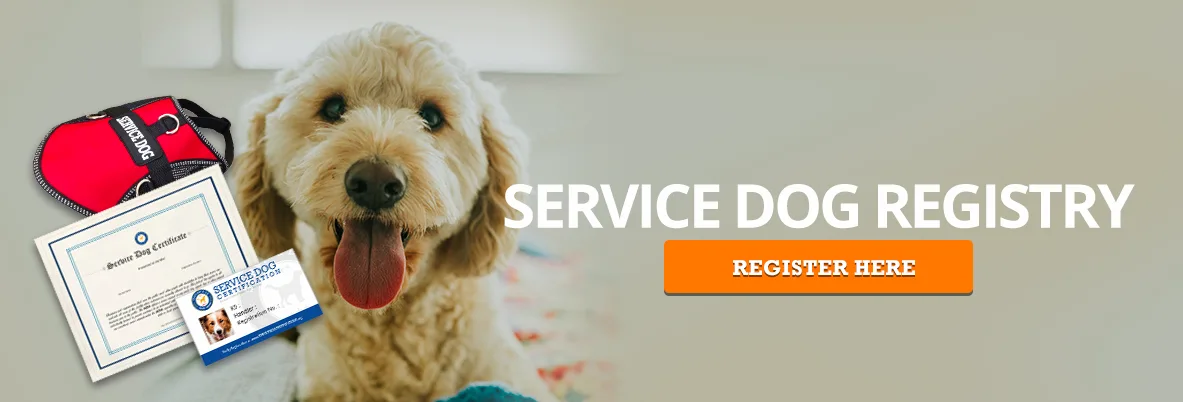Home Page › Blog › How to Register a Dog as a Service Dog in Virginia
How to Register a Dog as a Service Dog in Virginia

Service dogs are a priceless asset to many individuals navigating physical and mental health challenges. Virginia protects these individuals by providing legal protections and privileges for service dog handlers.
In the Old Dominion State, service dogs are granted unhampered access to public spaces where other animals are typically disallowed. These trained helpers are also permitted in residential properties that might not usually allow pets. What’s more, service dogs are allowed on flights without extra charges.
In this post, we’re excited to share essential information about service dogs in Virginia.
Who is eligible for a service dog in Virginia?
Service dogs are far from ordinary pets. They are legally recognized assistance animals catering to individuals with disabilities. According to the Americans with Disabilities Act (ADA), a person with a disability is defined as:
“someone with a physical or mental impairment that significantly limits one or more major life activities.”
Eligibility Criteria: The handler should possess a physical or mental health disability, and the dog must be trained, either by the handler or a professional, to perform tasks directly related to this disability.
Service dogs can carry out various tasks, such as assisting individuals with visual impairments, offering deep pressure therapy for psychiatric disabilities, or aiding in mobility for those with physical disabilities.
Service dogs meant for individuals with mental or intellectual disabilities are referred to as psychiatric service dogs.

Getting Your Service Dog Registered in Virginia
Is it compulsory? In Virginia, like in other states, there isn’t a formal requirement for service dog registration. Still, many handlers register their dogs in voluntary databases to obtain identification cards.
Perks: Owners of service dogs use tools such as vests, ID cards, and certificates to publicize their dog’s special status. These aids can effectively communicate to the public that the dog is a highly trained service dog, not a mere pet.
They can help dissuade unnecessary questioning about the dog’s presence in pet-restricted areas and prevent interference while the dog is on duty.
However, these tools should not be seen as a substitute for authentic service dog verification. No one can demand these items as proof of access. They are merely presented for the handler’s convenience.
The only valid verification: In Virginia, if a service dog’s necessity isn’t immediately evident, third parties may ask the following two questions:
Is the dog a service dog required for a disability?
What work or task has the dog been trained to perform?
Any Virginian service dog handler capable of appropriately answering these questions must be granted access to public spaces without the need for any documentation.
To register your service dog and secure an ID card, Service Dog Certifications (SDC) offers a database and accessories for service dogs. Here’s how to register your service dog with SDC in Virginia:
- Confirm your status as a service dog handler
You will need to confirm that you’re a service dog owner in Virginia with a disability and possess a fully trained service dog.
- Provide details of the service dog and owner
This information will be recorded in the service dog registration database.
- Provide your email address
This is where your digital identification card and registration information will be sent.
- Upload a recent photo of your service dog
The image will be featured on the ID card and in the database.
- Choose optional accessories
You have the option to order additional service dog identification cards, a service dog collar tag, a paper certificate, a vest, and more.
Training a Service Dog in Virginia
Service dogs must be expertly trained to execute their intended tasks. Additionally, the dog must exhibit good behavior and be under control in public environments.
You can train a service dog in three main ways:
- Adopt a dog from a service dog trainer: This involves adopting a dog that has already been trained for the tasks you require. However, this route can be costly.
- Engage a professional trainer: This allows you to select a dog and entrust the training process to a professional.
- Train independently: Handlers can train their service dogs without external help. While potentially more time-consuming, this method can foster a more profound handler-dog relationship. Before choosing this option, consider your ability and knowledge to train a service dog.
Virginia State Laws
While federal laws offer protections for service dogs and their handlers, Virginia law also lends support under Virginia Code § 51.5-44. This statute gives special rights to people that require the use of a service animal.
Virginia law also penalizes fraudulent representation of a pet as a service animal. In Virginia, it is illegal to knowingly and willfully fit a dog with service dog accessories “in order to represent that the dog is a service dog or hearing dog to fraudulently gain public access.”
It’s vital to remember that handler honesty is a key component in maintaining trust and integrity within the service dog community.
Virginia Service Dog News
In an unfortunate event, a Virginia family was scammed out of $17,000 they spent to buy a service dog for their autistic daughter. The couple paid money to a nonprofit that was charged with a felony count of theft by swindle.
This case highlights the importance of using service dog organizations and trainers that are trustworthy and properly vetted. If you’re adopting a service dog rather than training one yourself, make sure the organization has a proven track record of successful service dog placements. Don’t hesitate to obtain referrals and references to validate a service dog provider.
About the Author: The writing team at Service Dog Certifications is made up of folks who really know their stuff when it comes to disability laws and assistance animals. Many of our writers and editors have service dogs themselves and share insights from their own experiences. All of us have a passion for disability rights and animals.
2 comments
Leave a Reply Cancel reply
Latest Posts

How to Bring a Service Dog to Disneyland
Trained service dogs are more than welcome to join their handlers at Disneyland. In this guide, we’ll explain Disneyland’s policies and give practical advice for bringing a service dog to Disneyland for the first time. Disneyland’s Service Dog Policies The Magic Kingdom is happy to welcome trained service dogs across most park locations! They kindly […]

Read More

Can Dogs Eat Tomatoes?
Yes! Dogs can safely enjoy tomatoes, but there are a few risks to be aware of so you can feed your dog responsibly. Fully ripe tomatoes (without the stems and leaves) can actually have nutrients that are good for your pup. Tomatoes have chlorogenic acid, an antioxidant that can have anti-inflammatory effects in cells. They’re […]

Read More

Can a Primary Care Doctor Write an ESA Letter?
Your family doctor, also called a primary care physician (PCP), can write a letter recommending an emotional support animal. We’ll explain what legally gives them that ability and explore what better options might be available for you. Why are Physicians Able to Write an ESA Letter? To turn your pet into an emotional support animal, […]

Read More








I’m am severe hard of hearing/ deaf. I have a dog that clings to me. I can’t hear if someone knocks on my door. She also hops on my lap if I cry.
Can she be a service dog?
To qualify for a service dog you must fulfill two key requirements: 1. Your condition has to meet the criteria for being an eligible disability and 2. Your dog must be trained to perform a task directly related to that disability. Please see this guide for more details about service dog requirements: https://www.servicedogcertifications.org/service-dog-requirements/